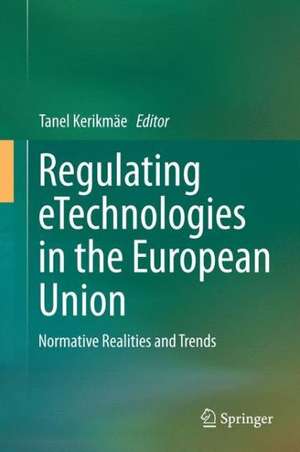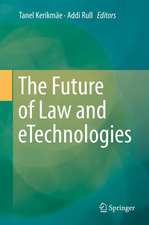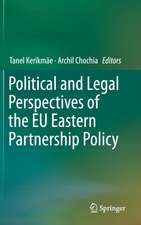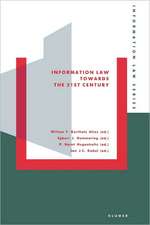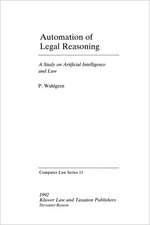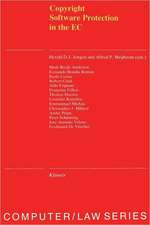Regulating eTechnologies in the European Union: Normative Realities and Trends
Editat de Tanel Kerikmäeen Limba Engleză Hardback – 30 iul 2014
| Toate formatele și edițiile | Preț | Express |
|---|---|---|
| Paperback (1) | 642.36 lei 43-57 zile | |
| Springer International Publishing – 23 aug 2016 | 642.36 lei 43-57 zile | |
| Hardback (1) | 648.56 lei 43-57 zile | |
| Springer International Publishing – 30 iul 2014 | 648.56 lei 43-57 zile |
Preț: 648.56 lei
Preț vechi: 763.01 lei
-15% Nou
Puncte Express: 973
Preț estimativ în valută:
124.10€ • 129.92$ • 102.69£
124.10€ • 129.92$ • 102.69£
Carte tipărită la comandă
Livrare economică 07-21 aprilie
Preluare comenzi: 021 569.72.76
Specificații
ISBN-13: 9783319081168
ISBN-10: 3319081160
Pagini: 336
Ilustrații: IX, 324 p. 9 illus.
Dimensiuni: 155 x 235 x 27 mm
Greutate: 0.64 kg
Ediția:2014
Editura: Springer International Publishing
Colecția Springer
Locul publicării:Cham, Switzerland
ISBN-10: 3319081160
Pagini: 336
Ilustrații: IX, 324 p. 9 illus.
Dimensiuni: 155 x 235 x 27 mm
Greutate: 0.64 kg
Ediția:2014
Editura: Springer International Publishing
Colecția Springer
Locul publicării:Cham, Switzerland
Public țintă
ResearchCuprins
Tanel Kerikmäe, Introduction: E-Regulation in the European Union. Normative realities and trends.- Tanel Kerikmäe and Pawan Dutt, Conceptualization of emerging legal framework of e-regulation in the European Union.- Katrin Nyman Metcalf, e-Governance in law and by law. The legal framework of e-governance.- Ülle Madise and Priit Vinkel, Internet voting in Estonia: From constitutional debate to evaluation of experience over six elections.- Addi Rull, Ermo Täks, and Alex Norta, Towards software-agent enhanced privacy protection.- Johan Axhamn, Striking a fair balance between the protection of creative content and the need to foster its dissemination: The challenges posed by internet linking and meta search engines.- Mari Männiko, Intermediary service providers’ liability exemptions - Where can we draw the line?.- Kristi Joamets, Civil status registration – More than data collection. EU digital development in promoting the free movement of civil status document.- Agnes Kasper, The fragmented securitization of cyberthreats.- Agnes Kasper, Legal aspects of cyber security in emerging technologies – Smart grids and big data. European answers to security breaches and „common“ cybercrime.- Edita Gruodytė and Mindaugas Bilius, Investigating cybercrimes: Theoretical and practical issues.- Maria Claudia Solarte-Vasquez, Reflections on the concrete application of principles of internet governance and the networked information society in the European Union institutionalization process of Alternative Dispute Resolution methods.- Pawan Kumar Dutt and Tanel Kerikmäe, Concepts and problems associated with eDemocracy.
Textul de pe ultima copertă
The EU strategy 2020 includes ambitious plans for e-regulation that could improve Europe’s competitiveness. However, the European states have very different legal frameworks in this field. This book introduces flagship initiatives and provides a detailed overview and analysis of the current standards and latest developments, offering practical insights and guidelines for practitioners and policy-makers alike. Further, as it discusses the main areas of e-regulation, it can serve as a useful platform for university education in light of the growing need for new kinds of specialists, i.e. IT lawyers. The book concentrates on fields that are directly affected by e-regulation such as cyber-security, databases, computer programs, e-governance, IP and competition law, and informatics.
Caracteristici
Presents a systematic overview of the most relevant fields of e-regulation Offers practical guidelines on the basis of binding legal norms and case-law Maps the current standards, problem areas and trends Includes supplementary material: sn.pub/extras
